
Welcome to ASB Logistics Co. Ltd
Chinese | Contact | Collection | Website Map | Help
NVOCC NUMBER:MOC-NV 06902

Welcome to ASB Logistics Co. Ltd
Chinese | Contact | Collection | Website Map | Help
NVOCC NUMBER:MOC-NV 06902
Contact us

Fax:
0086-755-2512 4462
Email:
inquiry@asb-china.com
chartering@asb-china.com
oogcontainer@asb-china.com
Address:
Chinese Shennan Road East Shenzhen Hongchang square 2110-2111

Browse:9995
From:ASB
Time:2016-03-11
More ships built to transport iron ore and coal have been scrapped so far this year than in all of 2014 as the commodity slump stunts the life expectancy of bulk carriers.
Twenty-nine capesize vessels with an average age of 21.4 years have been turned into scrap through Friday last week, according GMS Inc, the world’s biggest cash buyer of ships for recycling, citing data from Clarkson PLC.
That is a faster pace than the 93 destroyed all of last year and the 25 in 2014.
The Baltic Dry Index, a measure of what shipowners earn from transporting commodities, has plunged to the lowest in more than 30 years amid slowing Chinese demand.
“The capes are always the most volatile of the dry cargo markets because they’re so limited in the cargoes they can carry,” Thomas Alexander, the general manager of GMS in Singapore, said by telephone.
“They really only carry either coal or iron ore. At the height of the iron ore boom and at the tightest point of the cargo market in May 2008, capesize vessels were earning in excess of US$200,000 a day. Everyone is losing money now,” he said.
Iron ore and coal prices have tumbled as China’s appetite for the commodities used to make steel waned.
The slump has hit the shipping sector, prompting D/S Norden A/S of Denmark to writedown the value of its dry cargo fleet by US$180 million in January.
Rival Scorpio Bulkers Inc has sold all of its Capesize vessels and the dry bulk market will be in “pure survival mode for the coming year,” according to notes last month from Clarksons Plateau Securities.
The Baltic Dry Index, which has dropped about 26 percent this year, slid to 290 points on Feb. 10, the lowest level in daily data compiled since January 1985.
Typically built to last about 25 years, the average demolition age of capesize vessels was 24 in 2014 and 21 last year, GMS said.
While thermal coal and iron ore have clawed back from recent lows, prices for both are more than 60 percent off their 2011 highs. Iron ore on Monday posted the biggest gain in daily data going back to 2009 and the highest price since June last year.
China’s economic growth slowed to 6.9 percent last year, the weakest pace in 25 years.
Chinese Premier Li Keqiang on Saturday announced a 6.5 percent to 7 percent expansion goal, the first range the government has offered since 1995.
The pace of China’s iron ore import growth slowed last year as companies from Rio Tinto Group to Vale SA increased output, expanding a global glut.
The nation’s overseas purchases of thermal and metallurgical coal has been declining each year since hitting a peak in 2013, according to estimates from Morgan Stanley.
“Everybody is bleeding,” Peter Sand, chief analyst at shipping association BIMCO, said by phone from Copenhagen.
“In 2007, we saw no ships in the capesize segment being demolished, so everything that could sail was out making money. It’s now become a war of attrition to see who will come out on top when markets move into positive territory,” he said.
Some companies are trying to weather the slump by parking ships in sheltered bays while waiting for demand and freight rates to recover.
Brunei Bay off the coast of Malaysia, a designated area for the anchoring of vessels from bulk carriers to rigs, has filled its 135 slots, according to International Shipcare, a provider of lay-up services in the area.
The anchorage reached capacity for the first time during the 41 years that International Shipcare has been operating at the bay, managing director Saravanan Krishna said from Malaysia.
Companies are seeking to keep vessels at the lay-up area for as long as two years and shipowners are paying about US$36,000 a month to park a capesize ship, Krishna said.
“I have so many queries every day, there are more than 50 ships on my waiting list,” Krishna said by phone, who estimates about 40 percent of the anchored vessels at Brunei Bay are bulk carriers from capesize to Panamax ships.
“I’ve never seen the market like this, it’s unprecedented,” he said.
Source: Bloomberg
 Bulk ships dying younger and faster...
Bulk ships dying younger and faster... China firms push for multi-billion doll...
China firms push for multi-billion doll... Newbuilding prices start retreating on ...
Newbuilding prices start retreating on ... Boxship Deployment Trends: New Loca...
Boxship Deployment Trends: New Loca... Newbuilding orders focused on specializ...
Newbuilding orders focused on specializ... Tankers: Asian VLCC freight rate d...
Tankers: Asian VLCC freight rate d... Dry bulk shipping fleet will grow by 1....
Dry bulk shipping fleet will grow by 1.... Dry bulk sectors struggling due to exce...
Dry bulk sectors struggling due to exce... Capesize slippage at 50% of orderbook...
Capesize slippage at 50% of orderbook... Dry Bulk Market: Finding the silver ...
Dry Bulk Market: Finding the silver ... Newbuilding activity grinds to a halt...
Newbuilding activity grinds to a halt... Oman Port Signs Iran Trade Deals...
Oman Port Signs Iran Trade Deals... Why a story about bulk shipping matters...
Why a story about bulk shipping matters... Global spot container rates hit record ...
Global spot container rates hit record ... More Mishaps on the Mississippi...
More Mishaps on the Mississippi... Asia Dry Bulk-Capesize Rates Flat ...
Asia Dry Bulk-Capesize Rates Flat ... China-owned ships: fleet expansion acce...
China-owned ships: fleet expansion acce... Port of New York and New Jersey Co...
Port of New York and New Jersey Co... Pace of Bulker Scrapping is Faster t...
Pace of Bulker Scrapping is Faster t... Rotterdam Port: Joint approach for th...
Rotterdam Port: Joint approach for th...
 sweep wechat
sweep wechat